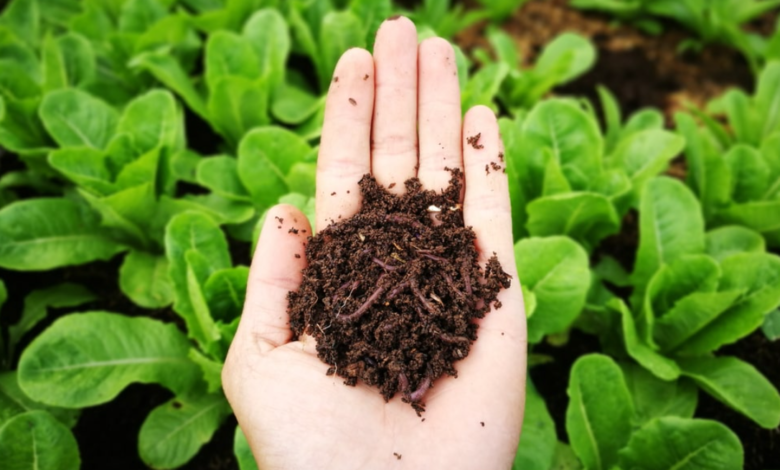The Benefits of Vermicomposting: Harnessing Worm Castings for Nutrient-Rich Soil

In our modern world, sustainability has emerged as a paramount concern, prompting a search for innovative solutions to tackle environmental challenges. Among these solutions, vermicomposting stands out as a remarkable practice that harmoniously combines waste reduction, soil rejuvenation, and community empowerment.
At its core, vermicomposting is an organic waste recycling process that harnesses the incredible abilities of earthworms to break down organic materials into a nutrient-dense, soil-enriching substance known as vermicompost or worm castings. This process not only diverts biodegradable waste from landfills but also yields a highly beneficial byproduct that nurtures plant growth and promotes sustainable agriculture.
Differentiating Vermicomposting from Traditional Composting
While traditional composting relies on microbial decomposition, vermicomposting utilizes the remarkable capabilities of specific composting worms, such as the industrious Red Wigglers (Eisenia fetida) and the resilient Indian Blues (Perionyx excavatus). These worms possess an extraordinary capacity to consume and break down organic waste at an accelerated rate, resulting in a faster and more efficient decomposition process compared to traditional composting methods.
The Intricate Components of a Thriving Vermicomposting System
To establish a successful vermicomposting setup, several key components must be carefully integrated:
- Worm Bin: A controlled environment, typically a container or enclosure, where the worms reside and carry out the decomposition process.
- Bedding Material: A carbon-rich substrate, such as shredded paper, cardboard, or coconut coir, that provides a habitat and nourishment for the worms.
- Earthworms: The star performers of the system, with Red Wigglers being the most commonly used species due to their voracious appetites and rapid reproduction rates.
- Organic Waste: A diverse range of biodegradable materials, including kitchen scraps, fruit and vegetable peels, coffee grounds, and plant trimmings, serve as the primary food source for the worms.
- Moisture Control: Maintaining an optimal moisture level in the bedding material is crucial, as the worms thrive in a damp but not waterlogged environment.
- Temperature and Airflow: Ensuring suitable temperature ranges and adequate airflow within the bin is essential for the worms’ well-being and the efficient breakdown of organic matter.
- Avoidance of Harmful Substances: Certain materials, such as meat, dairy products, and excessive citrus peels, should be avoided as they can disrupt the composting process and potentially harm the worms.
By carefully balancing these components, a thriving vermicomposting system can be established, transforming organic waste into a rich, soil-enhancing resource.
The Remarkable Benefits of Vermicompost for Soil and Plant Health
Vermicompost, the end product of the vermicomposting process, is a powerhouse of nutrients and beneficial microorganisms that offer numerous advantages for soil and plant health:
Nutrient Availability and Uptake
Vermicompost is laden with essential macronutrients like nitrogen, phosphorus, and potassium, as well as a wide array of micronutrients. Remarkably, these nutrients are readily available for plant uptake, fostering robust growth, increased yields, and overall vitality.
Improved Soil Structure and Water Retention
The organic matter present in vermicompost plays a crucial role in enhancing soil structure, and promoting better aeration, root penetration, and water retention capabilities. This improved soil structure not only supports plant growth but also helps mitigate soil erosion and reduces the need for frequent watering.
Pathogen Suppression and Disease Resistance
Vermicompost harbors a diverse community of beneficial microorganisms that can effectively suppress harmful soil-borne pathogens and plant diseases. This natural form of disease control reduces the reliance on chemical pesticides, promoting a more sustainable and eco-friendly approach to plant cultivation.
Stimulated Growth and Productivity
Vermicompost is rich in growth-promoting hormones, enzymes, and humic substances that stimulate plant growth, leading to stronger stems, increased branching, and more abundant flowering and fruiting. These properties contribute to enhanced crop productivity and yield, making vermicompost an invaluable resource for both home gardeners and commercial growers.
Seed Germination and Early Seedling Development
The nutrient-rich and well-aerated environment provided by vermicompost creates ideal conditions for seed germination and early seedling development. This advantage can be particularly beneficial for nurseries, greenhouses, and seed-starting operations, ensuring a strong foundation for healthy plant growth from the outset.
Soil Biodiversity and Ecosystem Balance
Vermicompost contributes to soil biodiversity by supporting a wide range of beneficial microorganisms, including bacteria and fungi. These microorganisms play a vital role in maintaining a healthy soil ecosystem, breaking down organic matter, cycling nutrients, and improving soil fertility. By promoting soil biodiversity and ecosystem balance, vermicompost helps create a resilient and sustainable agroecosystem.
Enhancing Cannabis Cultivation By Worm Castings
Worm castings are an excellent amendment for creating nutrient-rich soil, which is critical for the successful cultivation of cannabis. These organic materials are essentially earthworm waste, which might not sound appealing at first, but they are packed with a wealth of nutrients that plants can easily absorb. These nutrients include nitrogen, phosphorus, and potassium, which are key to the healthy growth of cannabis. Worm castings also improve soil structure, enhance moisture retention, and encourage the proliferation of beneficial microbes, making them an invaluable resource for growers looking to optimize their soil’s health and fertility.
Growers Choice Seeds, a reputable and trusted seed bank, offers a wide selection of high-quality feminized seeds, ideal for growers seeking to maximize their yields with potent, female plants. By starting with feminized seeds from Growers Choice Seeds, cultivators ensure that their garden space and resources are utilized efficiently, as these seeds eliminate the uncertainty of growing male plants, which do not produce the coveted buds. This efficiency is crucial when paired with the use of worm castings in the soil, as it allows for the full potential of these nutrient-rich amendments to be directed towards the growth of high-yielding, female cannabis plants.
The combination of utilizing worm castings for creating a rich, fertile growing medium and planting feminized seeds offers a synergistic effect for cannabis cultivation. This approach ensures that plants have access to the essential nutrients they need for vigorous growth, while also guaranteeing that every plant is a bud-producing female. For growers in the USA, opting for feminized seeds USA from Growers Choice Seeds means taking advantage of genetics specifically selected for their performance under various growing conditions, further enhancing the benefits that worm castings bring to the soil. This holistic approach to cannabis cultivation promises not only a more sustainable and productive garden but also superior quality cannabis.
Environmental Benefits and Waste Reduction
One of the most significant advantages of vermicomposting is its ability to divert organic waste from landfills. Organic waste, such as food scraps and yard trimmings, makes up a significant portion of municipal solid waste. When this waste decomposes in landfills, it produces methane, a potent greenhouse gas that contributes to climate change. By vermicomposting organic waste instead, we can significantly reduce methane emissions and mitigate the environmental impact of waste disposal.
Furthermore, vermicomposting offers a closed-loop system, where organic waste is transformed into a valuable resource. By recycling organic waste into nutrient-rich vermicompost, we can close the nutrient cycle and reduce our reliance on synthetic fertilizers. This not only conserves natural resources but also minimizes the environmental pollution associated with chemical fertilizers.
Community Engagement and Education
Vermicomposting presents an excellent opportunity for community engagement and education. Establishing community vermicomposting projects can empower individuals and communities to take an active role in waste reduction and sustainable practices. Schools, community centers, and gardening clubs can set up vermicomposting systems to teach students and community members about the importance of organic waste recycling, soil health, and sustainable food production.
Conclusion
Vermicomposting is a remarkable practice that harnesses the power of earthworms to transform organic waste into a valuable resource for soil and plant health. By diverting organic waste from landfills, vermicomposting reduces greenhouse gas emissions, conserves natural resources, and mitigates environmental pollution. The nutrient-rich vermicompost produced through this process enhances soil fertility, improves plant growth, and supports sustainable agriculture. Moreover, vermicomposting provides an opportunity for community engagement and education, fostering a sense of environmental responsibility and empowerment. As we strive for a more sustainable future, vermicomposting stands out as a remarkable solution that demonstrates the immense potential of nature to transform waste into fertile soil riches.





